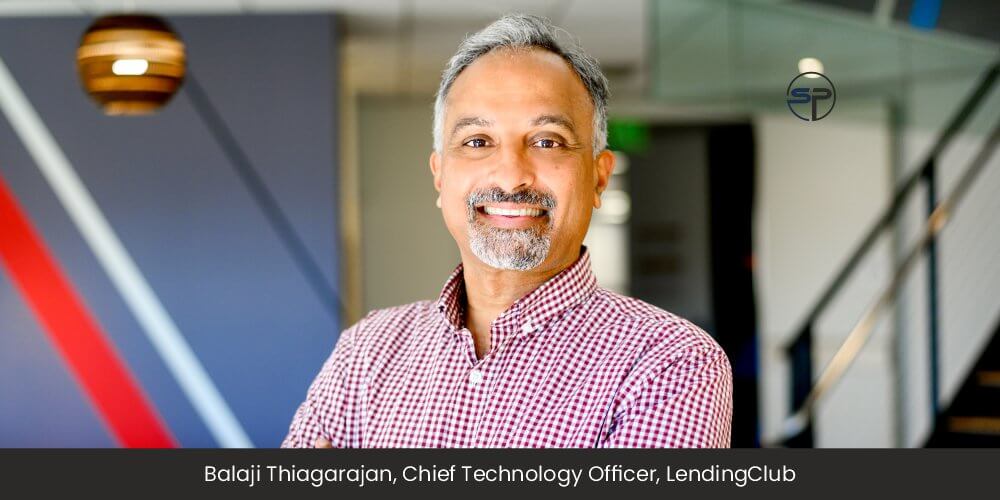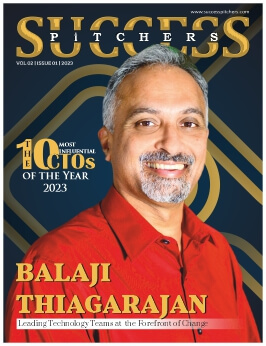Balaji Thiagarajan: Leading Technology Teams at the Forefront of Change
The 10 Most Influential CTOs of the Year, 2023

It’s crucial to be able to switch between the roles of player and coach when necessary and decide when to lean more toward one role than the other, according to LendingClub’s Chief Technology Officer Balaji Thiagarajan. Sharing one’s knowledge with the team through coaching enables leaders to take a step back from the minutiae and consider the larger picture. There are times, however, when putting in extra work as a player enables leaders to keep their skills sharp and truly comprehend and empathize with the difficulties their teams are facing. Balaji believes that these “T-shaped” executives – those who provide a significant competence or knowledge base in one area but are also able to work broadly across disciplines – will always be valuable in any sort of business, regardless of industry.
Career Route
Balaji Thiagarajan was born and raised in Mumbai, India, where he also attended college and graduated with a BS in engineering. He later traveled to the United States to complete his MS in Electrical and Computer Engineering. He began his career as a research associate in the field of distributed computing at Los Alamos National Laboratory at a time when multi-processor cores were the norm. After gaining valuable industry experience in software engineering, Mr. Thiagarajan returned to school to earn an MBA in Finance and Operations, which prepared him to assume senior operational leadership positions in the Technology sector.
LendingClub
Based in San Francisco, California, LendingClub is a digital marketplace bank that is rewriting the traditional rules of banking to create a new type of financial institution that uses technology to help its members earn more – whether in lending, spending, or savings.
In its early days, LendingClub established itself as the first peer-to-peer lender to provide loan trading on a secondary market and registered its offerings as securities with the Securities and Exchange Commission. While personal loans continue to be the company’s key loan product, LendingClub has evolved over the years to provide auto refinancing, purchase financing for medical, dental, and other healthcare services, as well as business loans. In 2021, LendingClub expanded its business model when it was one of the first US fintechs to acquire a national bank. This has allowed it to directly offer banking services such as checking, high-interest savings, and certificates of deposit and also hold deposits that it can use on its balance sheet. Its online banking and lending solutions are designed to help members pay less when borrowing and earn more when saving. LendingClub continuously researches and considers new and innovative products to meet member needs, and it anticipates that it will adapt and develop over time in response to member feedback.
Role as the Chief Technology Officer
As LendingClub’s Chief Technology Officer, Balaji is responsible for overseeing the company’s product development operations. He is responsible for Technology operations – including product, platform, and internal IT – as well as product and platform engineering, product management, program management, product design, user research, and technology operations.
Balaji sees his contribution to LendingClub’s mission as making the products – and its corresponding execution – as effective and frictionless as possible. Given how consumer banking habits have changed over the last several years – particularly during the COVID-19 pandemic – he believes that the number of consumers served by online financial services and products will continue to grow in the years ahead.
“We aim to put the power back into our members’ hands,” Mr. Thiagarajan says.
The Team’s Player-Coach
Balaji’s leadership philosophy is rooted in a player-coach model, which allows him to both assist his teams and enable them to reach their full potential. Being intentional in creating a culture where it is safe to take smart risks, fail, and learn, Balaji encourages teams to be creative and explore new ways to meet the opportunity or challenge at hand. Balaji is a proponent of employing the methods of inquiry and advocacy when leading. Whenever possible, he avoids a directive style and defers to the teams’ decision-making processes.
Long-term success in building a high-caliber team depends on clear directional leadership, a solid operational framework, and intentional delegation with support. Despite requiring a bit more time and perseverance, Balaji has seen this approach work in developing high-performance teams and a stable leadership bench.
The Virtue of Roadblocks
Balaji maintains that experiencing obstacles in learning new technologies and figuring out how to adapt to them is just business as usual in the technology field. Technology quickly becomes outdated, so it is unwise and short-sighted to believe that a past accomplishment automatically translates to future success. Both leaders and practitioners must constantly study how technology is changing, how to adapt, and how to use new ideas. They must be adaptable and eager to learn new things. He advises making sure to continuously collect data and improve upon proven methods.
He claims, “If you commit to being a lifelong learner, you will go far and accomplish great things.”
Balaji constantly strives to grow professionally. The book he found most helpful in his professional journey to date is the highly technical C Programming Language by Kernighan and Ritchie. In order to fully understand software engineering and the concepts underlying modern operating systems, he has frequently referred to the book throughout the years.
He comments, “I am glad I was able to get a decent handle on the C programming language because it laid the foundations for me to build a career in the tech industry.”
Execution or Innovation?
Like many forward-thinking tech companies, LendingClub needs to balance the seemingly conflicting demands of executing current strategy and pursuing innovative initiatives that help define the next phase of the business. Balaji challenges the idea that companies can only do one or the other. In fact, he sees LendingClub accomplishing two goals simultaneously: leveraging technology to operate the business by assisting members in getting the best value from its products while at the same time learning how to innovate and strengthen the member experience and product options.
- From an efficiency perspective
Balaji and his team are continuously considering how they can engage members in a way that provides value, whether that entails adding extra services, making tailored suggestions, or diversifying and offering product options. Are member interactions and procedures simple and intuitive? Can the workflows be changed to enhance the experience even more? The team asks itself these questions all the time.
- From an R&D perspective
LendingClub is examining ways to expand upon and go beyond what it now offers members. The company is constantly listening to members to see what additional benefits it can offer and how it can help members achieve their financial goals. This constant focus on the member impacts the type of innovations that LendingClub explores and pursues.
How LendingClub Is Different
Balaji says, “We are different from other traditional and digital banks because we started as a consumer lending fintech. Consumer lending is one of the hardest parts of retail banking and after being a leading consumer lending company for many years, we were one of the first U.S. fintechs to acquire a digital bank, paving the way for the next generation of banks and for others to follow our lead.”
Due to its involvement in both loans and digital banking, LendingClub stands out. As a cutting-edge digital marketplace that serves as a middleman between institutional investors and borrowers, it can provide lower-cost loans to borrowers and competitive risk adjusted returns for marketplace investors.
LendingClub, according to Balaji, distinguishes itself by being a mobile-first, cloud-first, and data-first organization. LendingClub considers mobile to be the future of banking, and working in the cloud enables it to scale and be more adaptable than ever before. However, it is LendingClub’s data capability that the company considers its most differentiating factor. Its data-driven intelligence automates many tasks a customer would otherwise need to complete manually and personalizes that experience for each member in a way that maximizes engagement.
He adds, “As it turns out, Tesla paved the path for personalized experiences in the auto industry. We believe that we are on the way to doing the same within the banking and lending ecosystem.”
The Prominent Role of Technology
Balaji believes that default experiences across sectors will shift to mobile-first over the next decade. In our daily lives, artificial intelligence and machine learning will become increasingly prominent, progressing from routine chores to sophisticated automation and decision-making scenarios.
LendingClub has a highly scalable FinTech platform that uses machine learning and artificial intelligence to drive insights throughout the customer journey. Based on changing customer needs, its design system and business application services offer real-time adaptive workflows. This makes it easier to customize the application experience and service to meet the unique demands of its members.
LendingClub’s machine-learned algorithms are supported by 15 years of data on $80 billion in loans to millions of customers, which has added 150 billion data cells to its private database. These informational points contribute to its proprietary scoring methodology that is more capable of predicting default than other more traditional credit models. Using cutting-edge machine learning and AI analytic tools, the team of data analysts and scientists mines this abundant historical data to continually improve the machine learning models to minimize fraud risk, repayment risk, and loan exposure while improving loan pricing and personalization throughout LendingClub’s members’ journeys.
A Unique Mix of Sneakers and Suits
Balaji believes that both the business and the industry are at a pivotal turning point, which is underscored by the change he has observed in LendingClub’s operations over the past few years as the company transformed beyond a peer-to-peer lending business and most recently expanded its services with the acquisition of a bank. The company balances technology innovation (or “sneakers”) with the responsibility of directly safeguarding money (or banking “suits”). He envisions a world where consumers never need to visit a physical bank since all the information they require is available on their phones. Consumer mobile experiences should be personalized for each individual, and member questions should promptly be addressed so that they never need to call customer care. Balaji believes that LendingClub is pushing the envelope for the benefit of both current members and everyone who banks because this has never been done before in the industry. All of this results in a workplace, he believes, that is incredibly energizing and motivating.
Vision for LC
LendingClub’s mission is to empower its members on their path to financial health. To do that, teams want to disrupt and simplify financial products that members can use easily. They are laying the groundwork for a much more expansive future: a member-centric, multi-product, scaled AI and ML-powered loan and banking marketplace that offers seamless, tailored, and mobile-centric products and services. The goal is to provide the public with intelligent financial products that streamline and personalize money management, allowing individuals to secure lower interest rates on the money they owe and higher returns on the money they have.
Advice for Tech Leaders
Balaji encourages the next generation of tech executives to understand that delegating will produce better results than attempting to handle everything on their own. It can seem counterintuitive because most professionals who advance through the ranks excel as individual contributors in their fields of specialization; nevertheless, as a leader, one cannot possess that same degree of proficiency in every field. Balaji claims that’s when the freedom to fail quickly, advocacy, delegation, and empowerment come into play. He believes a sustainable culture of empowerment can be fostered by adopting a learning posture and modeled with an environment where people are allowed to fail quickly, learn from their mistakes, and progress.
Website: www.lendingclub.com










